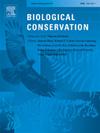改进欧洲蚂蚁生物安全政策的七项行动
IF 4.9
1区 环境科学与生态学
Q1 BIODIVERSITY CONSERVATION
引用次数: 0
摘要
入侵蚂蚁是造成最大生态、经济和健康损害的外来物种之一。欧洲联盟根据 2015 年起生效的立法,在 2022 年欧盟关注的外来物种清单中增加了四个蚂蚁物种。该条例是一项重大进展,但我们认为仍需采取若干行动,以克服和填补剩余的政策和实施差距。采用高效策略管理入侵蚂蚁物种可以避免其对生态和经济造成的严重影响。通过生态学家、立法者和实践者之间的合作,我们提出了七项行动,这些行动将加强欧盟对入侵蚂蚁的预防、监测和管理。我们建议(1) 禁止出于商业和个人目的有意引进所有外来蚂蚁,经授权的情况除外;(2) 制定蚂蚁入侵预防计划;(3) 在出境点与各国合作;(4) 制定蚂蚁入侵管理计划;(5) 建立蚂蚁分类学家网络,确保快速识别;(6) 提高公众和利益相关者的意识;(7) 建立专门安全的 "外来入侵物种应急基金",支持快速反应机制。对于所有行动,我们都提供了评估其实施情况和成功与否的指标。通过将我们自己的经验、其他国家的情况和专家咨询相结合,我们相信我们的建议为提高欧盟应对这一日益严重威胁的能力提供了一条务实可行的道路。虽然这些行动是针对蚂蚁制定的,但也可以推广到其他入侵物种。本文章由计算机程序翻译,如有差异,请以英文原文为准。
Seven actions to improve European biosecurity policy on ants
Invasive ants are among the alien species causing the greatest ecological, economic and health damage. The European Union has added four ant species to their list of alien species of Union concern in 2022, based on legislation in force since 2015. This Regulation constitutes a significant progress, but we believe that several actions are still needed to overcome and fill remaining policy and implementation gaps. Managing invasive ant species with efficient strategies can avert their severe ecological and economic impacts. Resulting from collaboration between ecologists, legislators, and practitioners, we propose seven actions that will enhance the prevention, surveillance, and management of invasive ants in the EU. We recommend: (1) prohibiting the intentional introduction of all alien ants for commercial and personal purposes, except in authorized cases; (2) establishing an Invasive Ants Prevention Plan; (3) cooperating with countries at points of exit; (4) establishing an Invasive Ants Management Plan; (5) building a network of ant taxonomists to ensure rapid identification; (6) raising awareness among the public and stakeholders; and (7) creating a dedicated and secure ‘Emergency Fund for Invasive Alien Species’ to support the rapid response mechanism. For all actions, we provide metrics to evaluate their implementation and success. By combining our own empirical experience, the situation in other countries, and expert consultations, we believe our recommendations offer a pragmatic and achievable path to improving the European Union's resilience to this growing threat. Although the actions are developed for ants, they can be extended to other invasive species.
求助全文
通过发布文献求助,成功后即可免费获取论文全文。
去求助
来源期刊

Biological Conservation
环境科学-环境科学
CiteScore
10.20
自引率
3.40%
发文量
295
审稿时长
61 days
期刊介绍:
Biological Conservation is an international leading journal in the discipline of conservation biology. The journal publishes articles spanning a diverse range of fields that contribute to the biological, sociological, and economic dimensions of conservation and natural resource management. The primary aim of Biological Conservation is the publication of high-quality papers that advance the science and practice of conservation, or which demonstrate the application of conservation principles for natural resource management and policy. Therefore it will be of interest to a broad international readership.
 求助内容:
求助内容: 应助结果提醒方式:
应助结果提醒方式:


